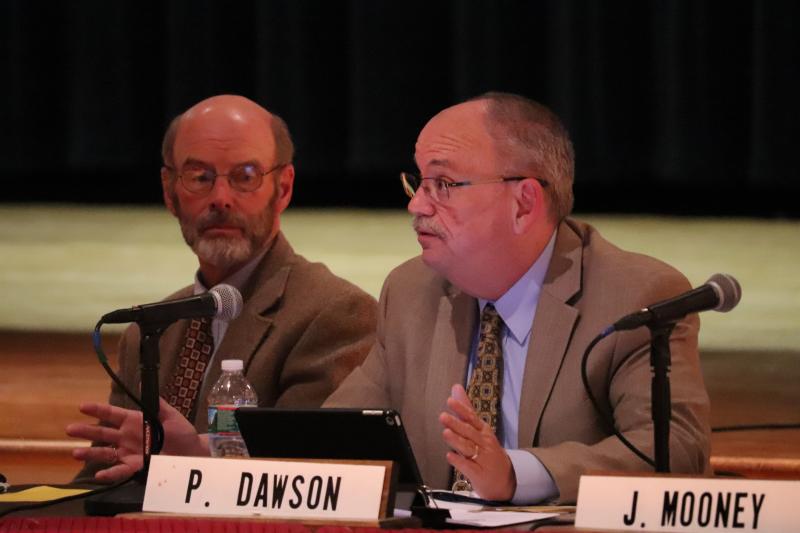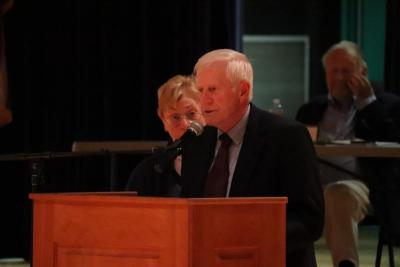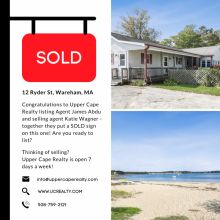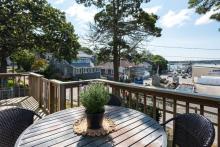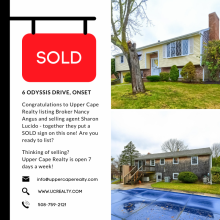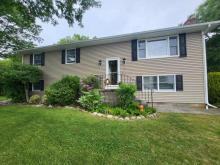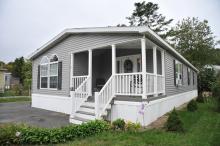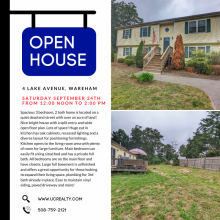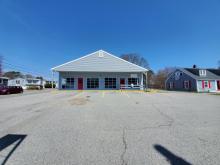Town Meeting voters deny setback amendment, approve Stretch Code
MARION — Voters opted to approve all but one item on the 13-article warrant that was presented at Marion’s Fall Town Meeting on Monday.
Town Meeting articles regarding Stretch Energy Code and energy efficient vehicles passed following some debate, but voters denied a developer’s request to reduce setbacks on his property.
Residents expressed concern that the setback amendment was too site specific and denied the article which proposed reducing minimum side and rear setbacks from 20 feet to 10 feet in only Residential E districts.
The proposal was submitted by developer Sherman Briggs to allow him to fit 27 housing units on a property located behind the Brew Fish restaurant. Currently, there is only one Residential E District in in Marion, so the amendment likely would not have impacted other developments.
“We’re changing bylaws so that somebody can develop a piece of land,” said Anne Beaulieau. “I am just concerned that there’s always an exception to the rule.”
Another resident, Vincent Malkoski, said that changing such a setback in an entire zoning district would “set a bad precedent.”
Planning Board Chair Stephen Kokkins explained to voters that the amendment would provide residents with quality multi-family housing. He added that the development would not strictly be affordable housing units and would also offer housing options for those looking to downsize.
“It does have three affordable units by statute,” he added. “We think that it strikes, in the 21st century, a better balance of the types of housing available to Marion residents across the spectrum.”
Robert Raymond also suggested that the issue could have been addressed by issuing a zoning variance for the particular project.
After comments ended, residents denied the bylaw amendment.
Marion voters did approve up to $55,000 to purchase four electric cars currently leased by the town and adopted the Stretch Energy Code following some discussion.
The state’s Green Community program provides access to grants for cities and towns to fund clean energy projects. Joining the program required voters to adopt the Stretch Code at Town Meeting, which are building requirements aimed at minimizing energy costs in new residential construction.
Some residents expressed approval of the code, but were concerned about underlying costs to the builders.
According to Jennifer Francis, member of the Energy Management Committee, there is only a small increase to initial building costs but homeowners would eventually recoup the costs because of energy savings and possible rebates.
“The Stretch Code is not that much of a stretch anymore,” said Andrew Daniel. “As a builder, I am all for this code.”
Other voters worried that the Stretch Code would increase building costs for renovations or historical renovations.
“Renovations do not apply to the stretch code,” said Building Commissioner Scott Shippey. “The only way it applies to it is when you buy appliances that are energy star rated.”
Voters ultimately approved the adoption of the Stretch Energy Code. According to Francis, Marion could become a Green Community by the end of the month and receive about $140,000 in grant money almost immediately.
Voters were also asked to consider the purchase of four electric vehicles on Oct. 22.
“These vehicles, we feel they are unnecessary for the individuals who use them,” said Peter Winters, on behalf of the Finance Committee. “Furthermore, the town has no specific plan for the purchase or for getting rid of the vehicles, nor for how they are used or how they are allocated.”
Francis explained that the cars, which were originally leased with grant money, have saved the town approximately $35,000 in gas and maintenance. She added that when the leases will expire, the town will consider either leasing new vehicles or buying new ones with the funds.
“These cars cost us basically nothing for three years,” said Selectman Norman Hills. “These vehicles are part of what we have, and if we don’t have these vehicles then you have got to go buy some new ones.”
Resident Stephen Nojeim said that being able to afford four vehicles for only $55,000 is “a great deal.”
Daniel asked if the town could wait until it receives the Green Community designation to then purchase the vehicles with grant money. Francis suggested it is possible but not guaranteed because grants are competitive and Marion would need to specifically apply for an electric vehicle grant.
Following little more debate, voters approved $55,000 for the vehicles.



